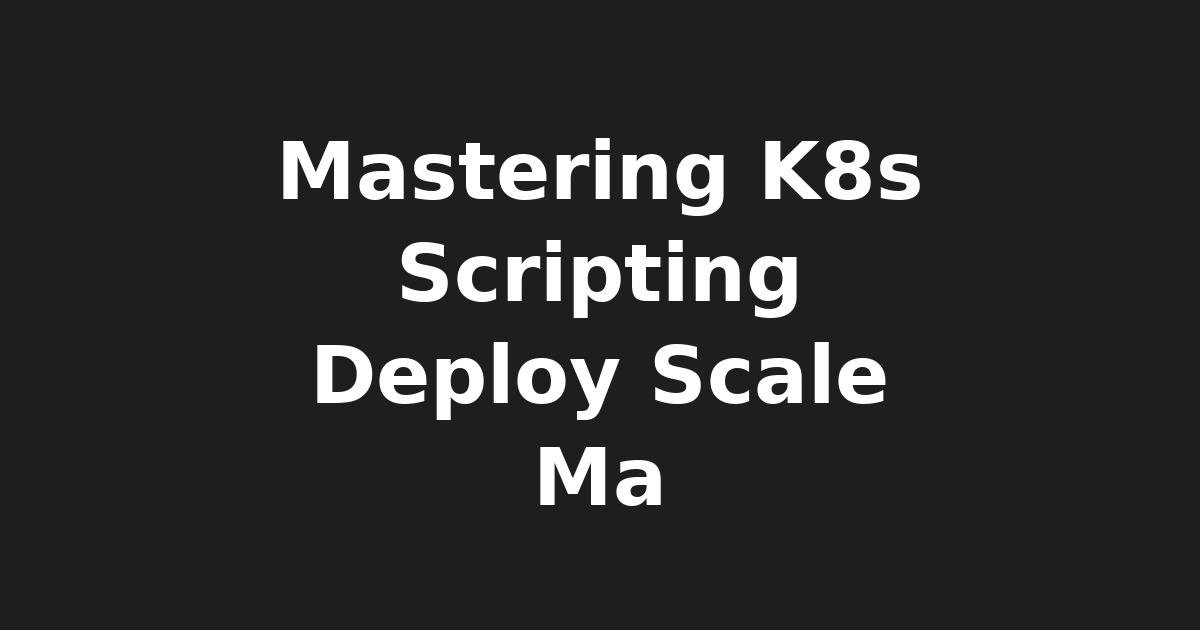Master Container Orchestration with Kubernetes: Streamline Deployment, Scaling…

👋 Hey There, Tech Enthusiasts!
Today, we're diving into the thrilling world of Container Orchestration using Kubernetes, Python, Bash, or PowerShell. If you've been following my journey here at KeepItTechie, you know that I'm all about simplifying tech for everyday people like us! 💻👨💻
First things first, why should we care about Kubernetes? Well, as more organizations embrace microservices and container technologies like Docker, efficiently managing those containers has become a top priority. That's where our friendly neighborhood open-source container orchestrator, Kubernetes (k8s), swoops in!
Kubernetes offers an incredible toolset for handling complex distributed systems, making it the go-to choice for developers, IT pros, Linux users, and system admins alike. By writing custom scripts or extending existing tools using Python, Bash, or PowerShell, you can automate tasks like deployment, scaling, monitoring, and updating microservices on Kubernetes clusters.
Now, let's talk tips! Here are a few pearls of wisdom to help you get started:
-
🐳 Get Familiar with Kubernetes Basics: Before diving into scripting, take some time to understand the fundamentals of Kubernetes, such as Pods, Services, and Deployments. This will make your journey smoother!
-
💻 Pick Your Poison (Python, Bash, or PowerShell): Choose the language you're most comfortable with. Each has its strengths, so it's essential to pick the right tool for the job at hand.
-
🔩 Use Official Kubernetes Client Libraries: These libraries provide a powerful and idiomatic way to interact with the Kubernetes API. They're like the swiss army knife of Kubernetes scripting!
-
🌐 Explore the Kubernetes Community: The Kubernetes community is vast, active, and welcoming. Join forums, read blogs, and don't hesitate to ask questions. Remember, there are no stupid questions – only stupid answers (usually mine!).
Now, let me share some personal insights. I've been using Python in my Kubernetes journey, and I must say, it's been a game-changer! Python's readability, simplicity, and powerful libraries make it perfect for scripting tasks in the realm of container orchestration.
As we look to the future, it's fascinating to consider where Kubernetes is headed. In 2025, I predict that we'll see even more integration between Kubernetes and AI/ML tools, further streamlining automation processes. The world of tech is constantly evolving, and staying on top of these advancements is crucial for keeping your skills sharp!
Lastly, remember to always approach learning new tech with an open mind and a can-do attitude. It's never too late to start exploring the fascinating world of Kubernetes and container orchestration. Keep pushing forward, and don't forget to have fun along the way! 🚀🤓
-Josh (KeepItTechie)
External Links: - Kubernetes Documentation - Python Kubernetes Client Library - Bash Kubernetes Scripting Guide - PowerShell Kubernetes Module
🙋♂️ This post was brought to you by Josh from KeepItTechie — helping you break into tech, one command at a time.
